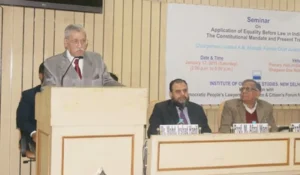This post scrutinizes the aftermath of the Bhopal Gas Tragedy, delving into the contentious legal confrontations and corporate responsibilities. In 1984, the Bhopal disaster revealed stark deficiencies in industrial safety and sparked an arduous legal and ethical battle. Union Carbide’s CEO, Warren Anderson, faced manslaughter charges but evaded trial, and a controversial settlement of $470 million by the corporation with the Indian government was criticized as paltry. Justice A.M. Ahmedi’s role became a focal point when, in 1996, he reclassified pivotal charges, affecting the pursuit of justice. This post further explores the systemic issues leading to the tragedy, suggesting a need for rigorous safety practices and transparent corporate governance to avert similar disasters.
